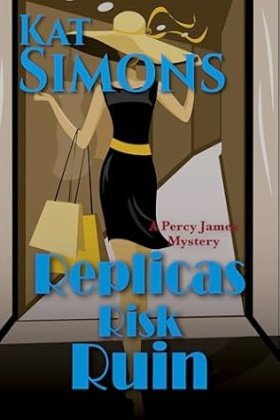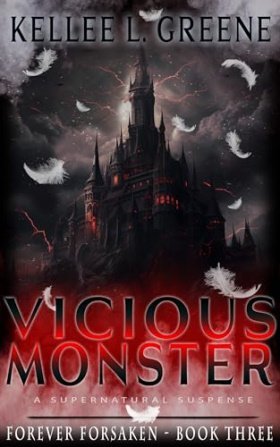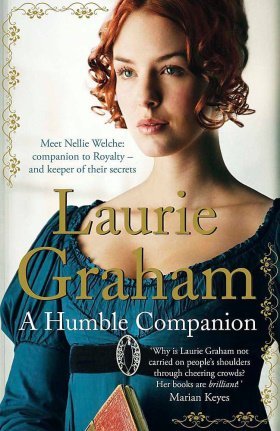‘Oh, good afternoon, madam,’ said Ivy, coming out of the small office. ‘We’re all ready for you. My assistant and I have reserved a special place for you to put your gown on. Perhaps you would care to step this way.’
‘I should like that girl to help me,’ Pearl announced. She pointed at Milly. ‘Her.’
‘With respect, madam,’ said Ivy, ‘that girl is the window-dresser.’
‘And I should like her to dress me.’ Pearl’s tone was strident.
Milly closed her eyes with a shudder.
‘In fact, I insist.’
Milly rose to her feet. Her sister, her eyes bright, smiled triumphantly. ‘Come along, girl,’ she said in a superior tone. ‘And bring my dress with you.’
By the time Pearl had gone, Milly was furious and trembling with embarrassment. Her sister had insisted that she put her gown on for her, and that she wait while Ivy and her team pinned and tucked the material more closely to her body. A couple of times, Milly made an attempt to leave, but Pearl soon called her back. She didn’t once mention who she was or why she wanted Milly with her, which of course made the whole incident all the more intriguing for the other staff members.
The wedding gown was fantastic. It was obvious to everyone that it had been made by some fashionable London designer and that it must have cost an absolute fortune. Satin, with a cowl neck and plunging back, it had a fish tail which went from the edge of the back seam to the floor. There were seams under the bust, and a front panel, which could all be taken in to give the dress a much more slender look. The long sleeves had covered buttons and the whole dress had been cut on the bias of the material. When Pearl stood in front of the mirror, Milly couldn’t help taking in a breath of admiration.
There was one moment when they were left alone. ‘I can’t wait to tell Mother I’ve seen you,’ Pearl whispered slyly. ‘How long have you been a shop girl?’
Hearing the venom in her voice, Milly fought the desire to justify herself. She wouldn’t give Pearl the satisfaction of seeing her embarrassment. Anyway, why should she feel embarrassed? Working in a shop was an honourable profession. Her sister was such a snob. Fortunately, just at that moment, Ivy came back to tell Pearl that the dress would be ready by Friday morning.
‘As you can imagine,’ Pearl said loftily, ‘I’m extremely busy at the moment. You can get your girl here to deliver it to me. She knows where I live, don’t you, dear?’
Ivy seemed puzzled as, without another word, Pearl swept from the department.
‘What was all that about?’ Ivy gasped when she’d gone. ‘How do you know her?’
Milly sighed. ‘Believe it or not, she’s my sister.’
On the big day itself, Milly was determined to see Pearl in the altered gown. She hadn’t got an invitation to the wedding, of course, but she couldn’t resist hovering around with the small crowd of villagers who had gathered in the churchyard outside St John’s Church in Findon on Saturday 8 January 1938. Milly had worn a wide-brimmed hat and came with a small watering can and some flowers. If anyone asked, which they didn’t, she’d planned to say she was changing the flowers on somebody’s grave, although it couldn’t be her father’s, because he was buried in the cemetery across the bypass.
As the guests arrived, Milly hardly recognised any of them. Not even Aunt Betsy was there, which was a little puzzling considering that Pearl was the first of her nieces to marry. Freddie looked magnificently handsome in some sort of German uniform, and Milly felt a pang of longing when she saw her mother entering through the lychgate. Agatha was dressed in pale violet with a pretty matching Italian guipure lace coat. She had expensive white leather gloves and a small-brimmed hat with netting at the front and a bow at the back.
When the bridal car arrived, Pearl walked beside a rather portly man with a smoke-stained moustache. As they posed for the photographer, the woman standing next to Milly said to her companion, ‘Who’s the man giving her away?’
‘That’s Councillor Warren, don’t you know,’ her friend replied. ‘Absolutely rolling in it, so they say.’
Milly recognised him now. He was the man who had squeezed her mother’s bottom at her father’s wake.
‘Apparently,’ the same woman continued, ‘he adores the bride’s mother. Would do anything for her, so I’m told.’
‘Poor sod,’ said her friend, and they both sniggered.
Pearl looked as beautiful as a film star, a cross between Joan Blondell and Loretta Young. There was a ripple of applause from the assembled crowd as she and Councillor Warren prepared to walk into the church arm in arm. Milly had a lump in her throat. Whatever had passed between them, she and Pearl were sisters. Weddings were a time when families came together – a time of celebration – but instead, she’d been left out in the cold. She should have been Pearl’s bridesmaid. Milly’s chin quivered with emotion as her sister posed by the church door for her final photograph as a single woman. She looked fantastic, and Milly wished she had a camera because the alteration on her sister’s dress did Ivy a lot of credit. The photographer’s bulb flashed and the wedding party turned to go.
Milly thought about staying long enough to see the wedding party come out of the church, but she decided it was too upsetting. Considering how unkind both her mother and sister had been towards her, Milly was surprised how much she missed being a part of the family. But she did. So, leaving the flowers on a stranger’s grave, she hurriedly left.
By the time Pearl and Freddie’s wedding was over, they had danced well into the night. It had been agreed that they should have Muntham Court to themselves for a few days by way of a honeymoon, so Agatha had gone away to spend a couple of nights with friends.
Pearl was a little tipsy as her bridegroom took her upstairs. She wasn’t nervous, of course. They had made love many times before, but this was the first time in their relationship that it wasn’t a quick fumble in the linen cupboard or a hasty episode on the floor with an anxious eye on the doorknob in case somebody came in.
As they entered the bedroom, he kissed her hungrily. Pearl responded with sighs and encouragements until Freddie turned her around to undo the buttons on the back of her gown. It took an age, and then she felt his hands slide within the dress and onto her belly. She moaned slightly and leaned back against him, but he had stopped exploring her body. He pressed her stomach firmly.
‘Where is it?’
‘Where’s what?’ she said dreamily.
He spun her back. ‘The baby!’ His face was dark.
Pearl sucked in her bottom lip. ‘Oh my darling, I’m sorry.’ She swallowed hard. ‘I lost our baby.’
He said nothing but continued to stare. She stepped out of her twisted gown and then it dawned on her that she was going to have to give the performance of a lifetime. Pearl’s eyes filled with tears. ‘I was so ill,’ she bleated, ‘and all I could think about was how could I tell you about our beautiful baby . . . I prayed to God that He would let me keep him . . .’ She was sobbing now. ‘But it didn’t matter how hard I tried . . . he came . . . oh Freddie, he came too early.’
‘When?’ he said coldly.
Pearl blew her nose. ‘What?’
‘When did it happen?’
‘Oh,’ she said, struggling to remember, ‘about a month ago.’
‘A month,’ he repeated coldly.
‘Yes.’ She grabbed his forearms dramatically. ‘Darling, I did my best. I’m so, so sorry.’
‘You lost our baby a month ago and you never thought to tell me,’ he snarled.
‘I wanted to, darling, really I did, but I couldn’t find the words.’
His expression was terrifying. ‘No, you thought if you told me, I wouldn’t marry you.’
Her heart was thumping. He’d never looked at her with such anger in his eyes. ‘Oh, Freddie . . . darling.’
His move was very quick. She didn’t see his hand go back but she felt the full force of the slap he gave her. She fell to the ground with a thump. ‘Bitch!’ he cried. ‘You bloody sodding bitch.’
Chapter 22
Easter 1938
The letter from the courts arrived just before Easter. As soon as she opened it, the judgement dominated Milly’s every waking moment. Her first thought was to contact Lena who was back in Worthing, helping Seebold with the children’s play park.
The Worthing Wonderland had finally opened on 2 April, but Milly had yet to see it. Just after her father had died, when she, Lena and Seebold had been together in the cottage, the girls had been convinced that Seebold wanted to rent the piece of land Lena had acquired near Bridge Halt, so it came as a surprise to realise that he had somewhere else in mind.
The plot was on the fringe of the Worthing and Lancing border. The beach was just across the road, and further up there was an area of wasteland. There was talk of a council development by the Teville Stream, but thus far it hadn’t materialised.
Worthing Wonderland stretched from Onslow Court, the new block of flats adjacent to the seafront, towards the Lancing border, and it was already so popular it seemed that Seebold had pulled a master stroke. Everyone was talking about it. Easter Monday was on 18 April, and fortunately the weather was mild and spring-like, which meant the day-trippers would soon be pouring through the gates.
At its beginning, 1938 had promised to be a brighter year after the turbulent days of the two previous ones. Edward VIII had abdicated just before Christmas 1936 to marry the woman he loved, and now he was to be known as the Duke of Windsor. In May 1937, the new king, George VI, had been crowned, and everyone had settled down with the feeling that some order and contentment had returned, but now all of that was being challenged again. The country was still reeling from the news that Adolf Hitler had annexed the Federal State of Austria. People were glued to their radios or reading their newspapers, and the daily conversation was of little else. What did this mean for Britain? How far would he go? Was it true that he already had his eye on Poland? But while the public trembled, the British establishment pretended it wasn’t happening. It was obvious that there was little they could do, short of waging war, and – given that it was less than twenty years since the end of the Great War – the appetite for another full-blown conflict just wasn’t there.










 Set in the aftermath of World War II, the story typically follows two sisters whose bond is tested by secrets, hardships, and unforeseen circumstances.
Set in the aftermath of World War II, the story typically follows two sisters whose bond is tested by secrets, hardships, and unforeseen circumstances.











